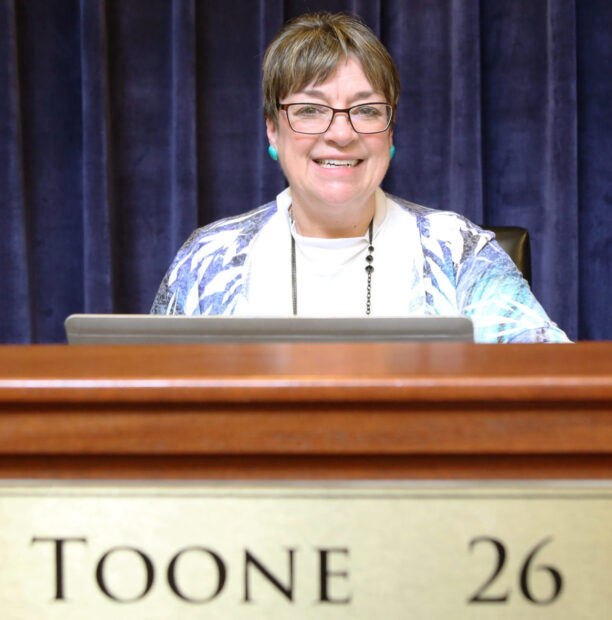House and Senate Democrats are pushing a bill to provide loan assistance to educators working in rural schools.
Sponsored by Rep. Sally Toone, D-Gooding, Rep. Muffy Davis, D-Ketchum, and Sen. Janie Ward Engelking, D-Boise, the bill would provide up to four years’ worth of education loan assistance to teachers who remain in the same school or district.

Toone and Ward-Engelking told the House Education Committee that the program is designed to aid recruitment and reduce attrition in rural schools.
“New teachers have so many things on their plate to just start a career,” said Toone, a retired educator. “Our intent is to offer a carrot to those working in rural or economically disadvantaged schools.”
If the bill passes, it would provide loan assistance for up to four years:
- First year: $1,500.
- Second year: $2,500.
- Third year: $3,500.
- Fourth year: $4,500.
In order to continue receiving assistance after the first year, educators would be required to remain employed at the same school or same district.
Ward-Engelking said sponsors worked with a wide variety of education groups in drafting the bill, and have the support of “all stakeholders,” including the State Board of Education and Superintendent of Public Instruction Sherri Ybarra.
“It is our hope if we attract and incentivize teachers to go to into a rural community, they are going to fall in love with the students and parents and the community and want to stay,” Ward-Engelking said.
A fiscal note attached to the bill estimates the loan assistance program could cost $1 million per year, plus about $50,000 for administration. The Joint Finance-Appropriations Committee did not provide any program funding when it set the public schools and State Board of Education budgets this week. However, if the loan assistance bill passes both houses, JFAC could consider providing funding.
House Education voted to introduce the bill Thursday, clearing the way for it to return to the committee for a full hearing.
Nontraditional teacher prep program bill advances
After a lengthy debate, a divided House Education Committee voted to advance House Bill 93, which would allow nontraditional teacher preparation programs to seek state funding.
Pushed by Teach for America lobbyist Blake Youde, the bill would allow programs such as TFA to apply for funding assistance from the State Department of Education.
Youde and sponsoring Reps. Judy Boyle, R-Midvale, and Gayann DeMordaunt, R-Eagle, said passing the bill would provide one more tool to address teacher turnover.
“It is very hard to get someone to come to rural Idaho unless they actually grew up there or if they marry a rancher or farmer and live right there,” Boyle said.
Under the bill, State Board-approved nontraditional preparation programs that contract with a district or charter school could apply for state funding to recruit, train and retain teachers.
In order to receive funding, the programs would need to match state dollars by at least 100 percent and demonstrate that their teachers achieve above-average student growth.
Currently, the State Board has approved only two such nontraditional teacher prep programs — TFA and ABCTE.
TFA takes colleges graduates who do not complete a traditional teacher education program, provides five-week intensive training programs, then places teachers in high-poverty or underserved schools.
Although TFA teachers account for only 40 of Idaho’s more than 18,000 teachers, alternative routes to teaching are on the rise overall. In 2017-18, 5.5 percent of all teachers were working under some form of alternative education, according to the SDE. ABCTE accounted for 270 teachers working in Idaho.
Committee members all praised TFA and state-approved nontraditional teacher preparation pathways. But several lawmakers said they could not support sending taxpayer dollars to outside organizations or nonprofits.
“I have not been convinced we need public funding into the mix,” Rep. Gary Marshall, R-Idaho Falls.
The fiscal note attached to the bill said there is no impact to the state budget unless the Legislature approves funding. The bill says programs such as TFA “may obtain funding from the SDE,” meaning the state is not required to provide such funding. By way of example, Youde told legislators TFA could apply for $500,000 from the state, and then would be required to match that.
So far, JFAC has not provided any funding, but could reconsider if the bill passes the House and Senate.
The bill passed, with Reps. Dorothy Moon, R-Challis, Tony Wisniewski, R-Post Falls, John McCrostie, D-Garden City, and Marshall voting against it. HB 93 heads next to the House floor, with a recommendation it pass.
